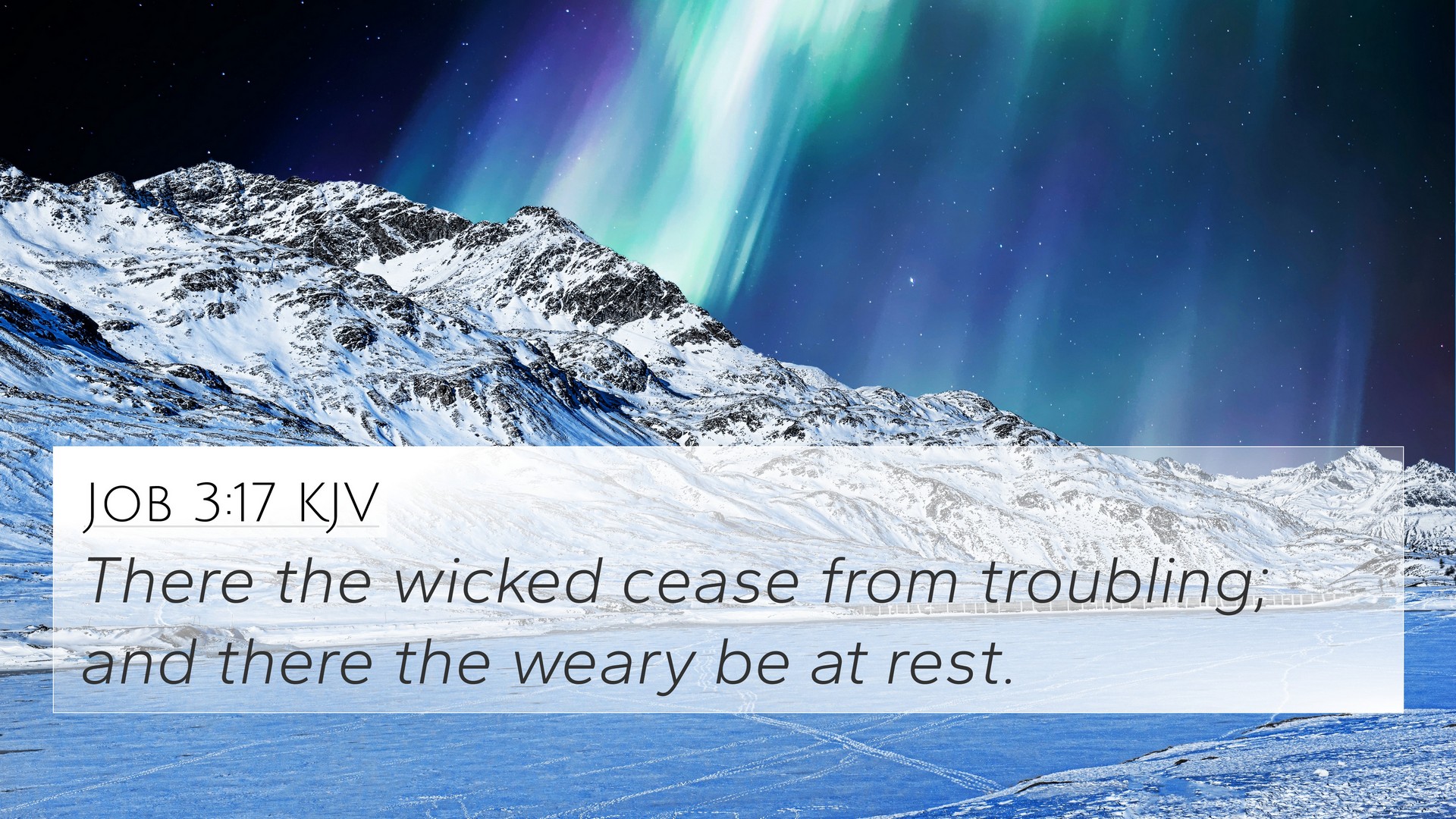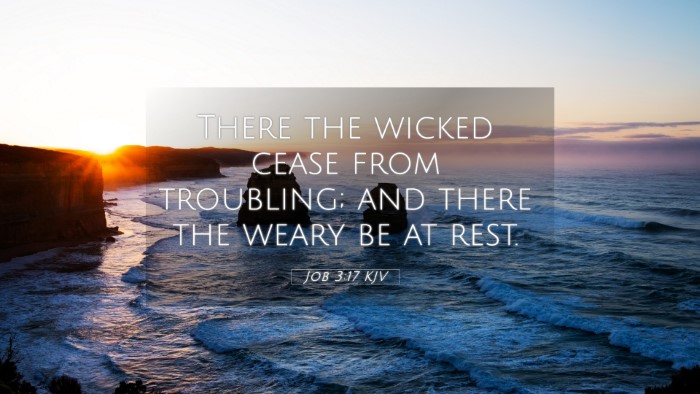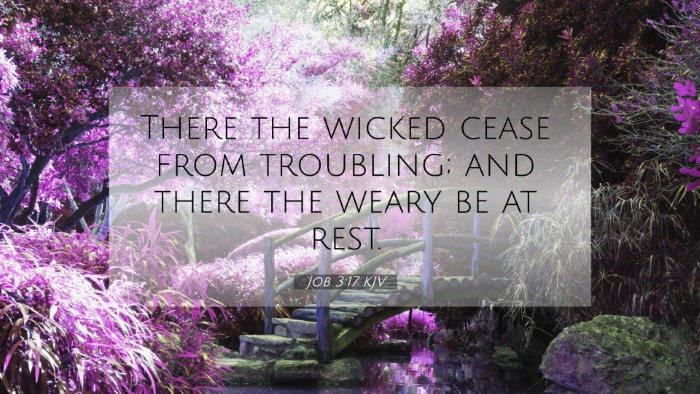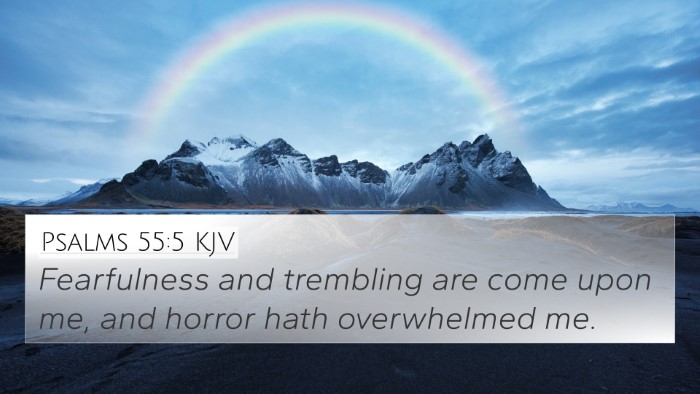Old Testament
Genesis Exodus Leviticus Numbers Deuteronomy Joshua Judges Ruth 1 Samuel 2 Samuel 1 Kings 2 Kings 1 Chronicles 2 Chronicles Ezra Nehemiah Esther Job Psalms Proverbs Ecclesiastes Song of Solomon Isaiah Jeremiah Lamentations Ezekiel Daniel Hosea Joel Amos Obadiah Jonah Micah Nahum Habakkuk Zephaniah Haggai Zechariah MalachiJob 3:17 Similar Verses
Job 3:17 Cross References
There the wicked cease from troubling; and there the weary be at rest.
Uncover the Rich Themes and Topics of This Bible Verse
Listed below are the Bible themes associated with Job 3:17. We invite you to explore each theme to gain deeper insights into the Scriptures.
Job 3:17 Cross Reference Verses
This section features a detailed cross-reference designed to enrich your understanding of the Scriptures. Below, you will find carefully selected verses that echo the themes and teachings related to Job 3:17 KJV. Click on any image to explore detailed analyses of related Bible verses and uncover deeper theological insights.
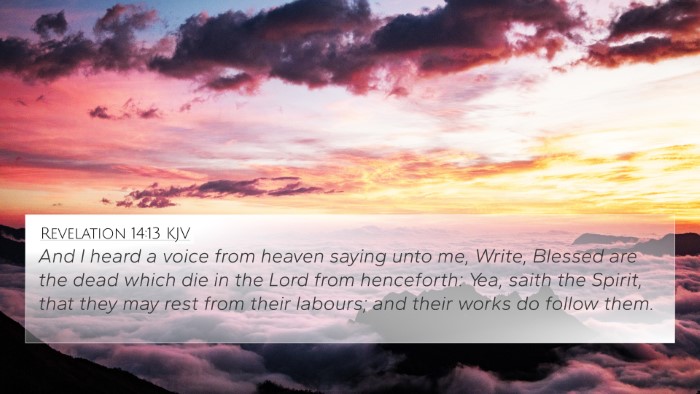
Revelation 14:13 (KJV) »
And I heard a voice from heaven saying unto me, Write, Blessed are the dead which die in the Lord from henceforth: Yea, saith the Spirit, that they may rest from their labours; and their works do follow them.
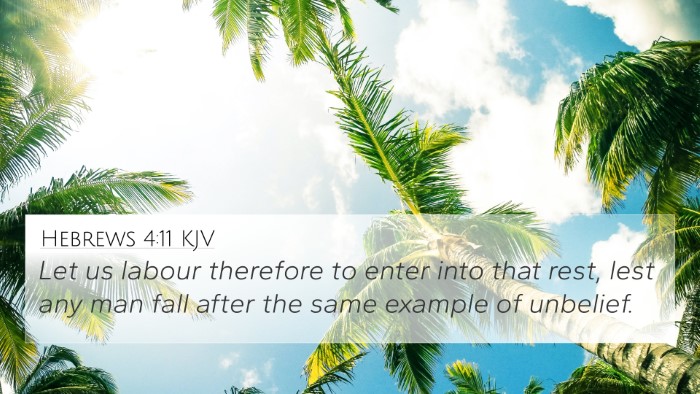
Hebrews 4:11 (KJV) »
Let us labour therefore to enter into that rest, lest any man fall after the same example of unbelief.
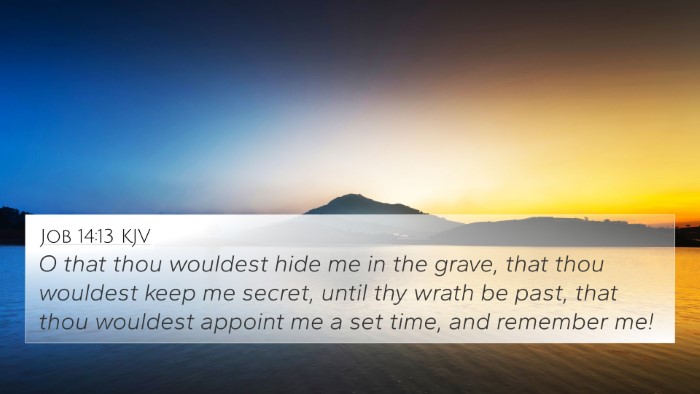
Job 14:13 (KJV) »
O that thou wouldest hide me in the grave, that thou wouldest keep me secret, until thy wrath be past, that thou wouldest appoint me a set time, and remember me!

Isaiah 57:1 (KJV) »
The righteous perisheth, and no man layeth it to heart: and merciful men are taken away, none considering that the righteous is taken away from the evil to come.
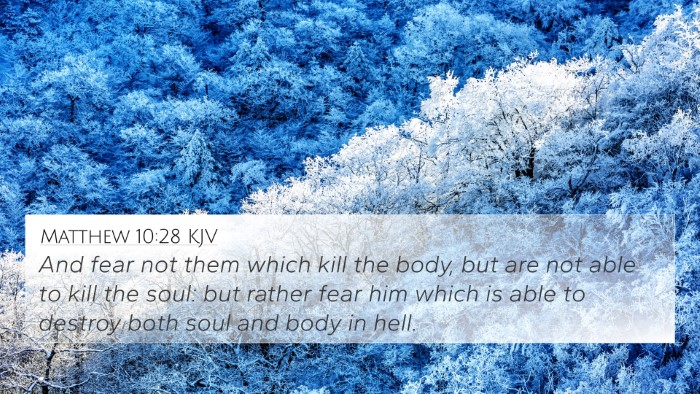
Matthew 10:28 (KJV) »
And fear not them which kill the body, but are not able to kill the soul: but rather fear him which is able to destroy both soul and body in hell.
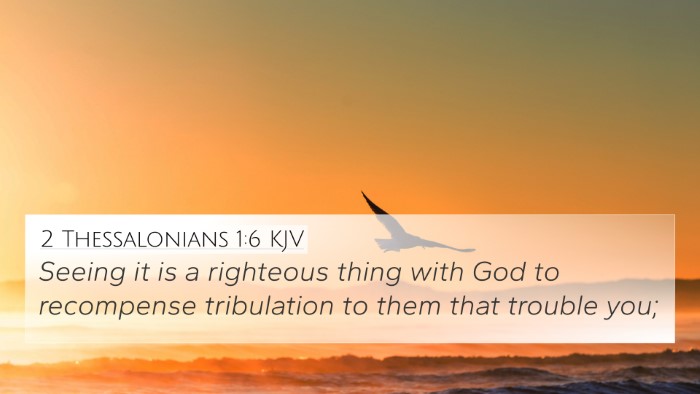
2 Thessalonians 1:6 (KJV) »
Seeing it is a righteous thing with God to recompense tribulation to them that trouble you;
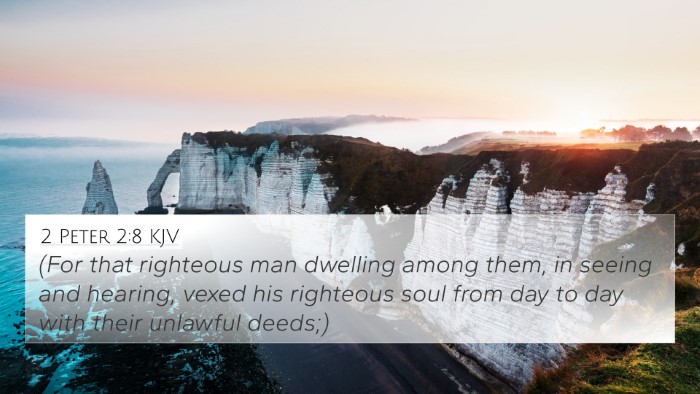
2 Peter 2:8 (KJV) »
(For that righteous man dwelling among them, in seeing and hearing, vexed his righteous soul from day to day with their unlawful deeds;)
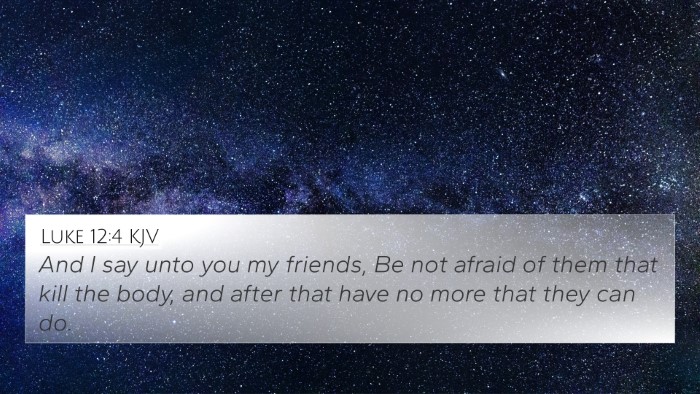
Luke 12:4 (KJV) »
And I say unto you my friends, Be not afraid of them that kill the body, and after that have no more that they can do.
Job 3:17 Verse Analysis and Similar Verses
Understanding Job 3:17
Job 3:17 speaks to profound themes of suffering and the desire for peace in the face of pain. In this passage, Job laments the state of the deceased, where he believes there is rest from the turmoil of life.
Verse Context
The verse states:
“There the wicked cease from troubling; and there the weary be at rest.” - Job 3:17
In this context, Job is expressing his despair and longing for relief from his suffering. His eloquent lamentation highlights the human quest for solace amidst overwhelming grief.
Commentary Insights
Various biblical commentators provide insights into the meaning of Job 3:17. Below are the combined interpretations from notable public domain commentators:
- Matthew Henry: Matthew Henry emphasizes the contrast between the troubled life of the wicked and the peace awaiting those who struggle. He suggests that death offers a cessation from life's turmoil, which is particularly poignant for Job as he grapples with intense suffering.
- Albert Barnes: Barnes points out that Job reflects on the state of the dead as one of rest. He interprets this verse as an expression of Job's desire for peace, underscoring the universal longing for escape from life's adversities.
- Adam Clarke: Clarke elaborates on the notion of weariness and rest, interpreting Job's words as a philosophical reflection on the nature of existence. He places significant weight on the contrast presented between the living, troubled world and the tranquility he perceives in death.
Thematic Connections
This verse can be linked to several themes within the wider biblical narrative, including:
- The Nature of Suffering: The ongoing human plight and struggles depicted through various scriptures such as Psalm 34:19, which states, "Many are the afflictions of the righteous: but the Lord delivereth him out of them all."
- Hope in Despair: Job’s reflections resonate with 2 Corinthians 1:4, which comforts us that God comforts us in our troubles.
- Peace after Death: This echoes the promise found in Revelation 14:13, “Blessed are the dead which die in the Lord…” showcasing a hope for eternal rest.
- Restoration of Justice: The longing for an end to wickedness can be related to Matthew 5:4, “Blessed are they that mourn: for they shall be comforted.”
- The Value of Life: Life’s trials are examined in Philippians 1:21, where Paul states, “For to me, to live is Christ, and to die is gain,” a sentiment resonant with Job’s pain.
- Faith and Doubt: Job’s struggles hint at the divine silence during suffering, a theme also echoed in Psalm 22:1, where the psalmist cries, “My God, my God, why hast thou forsaken me?”
- Existential Reflection: The stop to suffering aligns with Ecclesiastes 3:1-2, indicating there is a time to be born and a time to die, which engages with the broader existential questions posed in Job.
Cross-Referencing Biblical Texts
Job 3:17 serves as a pivotal verse that can be cross-referenced with other biblical passages. Here are some significant references that reflect similar themes:
- Isaiah 57:1-2: “The righteous perish, and no man layeth it to heart: and merciful men are taken away, none considering that the righteous is taken away from the evil to come.”
- Psalm 73:23-26: This passage underlines the assurance of God’s presence during life’s trials, reflecting on the ultimate peace found in Him.
- Romans 8:18: “For I reckon that the sufferings of this present time are not worthy to be compared with the glory which shall be revealed in us.”
- Job 14:14: Job’s exploration of life and death continues in this verse, asking, “If a man die, shall he live again?”
- Hebrews 4:9-10: “There remaineth therefore a rest to the people of God. For he that is entered into his rest, he also hath ceased from his own works, as God did from his.”
- 1 Thessalonians 4:13-14: Provides comfort regarding those who have died in Christ, discussing the hope of resurrection.
- Luke 16:25: The story of the rich man and Lazarus illustrates the reversal of fortunes in the afterlife, echoing Job’s sentiments.
Resources for Bible Cross-Referencing
Understanding Job 3:17 and its connections with other verses can be enhanced through various tools:
- Bible Concordance: Helps locate specific words and verses, enabling deeper study.
- Bible Cross-reference Guide: A resource for finding similar themes and connections.
- Cross-reference Bible Study: Techniques for linking verses in personal study or teaching.
- Bible Reference Resources: Various books and online tools for studying thematic connections.
- Cross-reference Bible Study Methods: Approaches for systematic study of related scriptures.
- Comprehensive Bible Cross-reference Materials: Resources to delve deeper into scriptural analysis.
Conclusion
Job 3:17 offers a poignant insight into the human experience of suffering, reflecting a universal desire for rest and peace. By engaging with this verse through cross-referencing and commentary analysis, we gain a richer understanding of its implications within the biblical narrative. Utilizing the resources available for studying the connections between Bible verses, one can explore the depth of God's word and the comfort it offers amidst life's trials.
